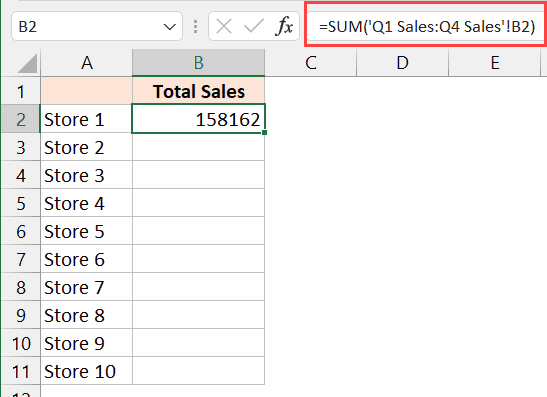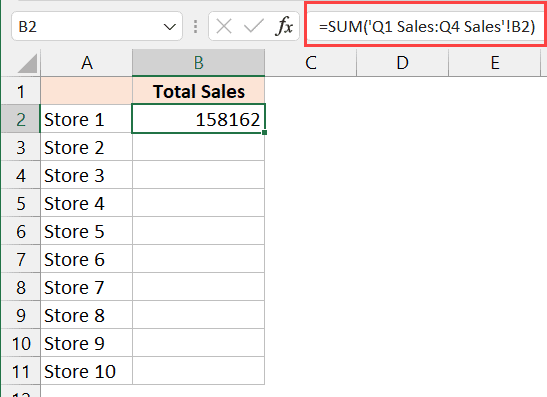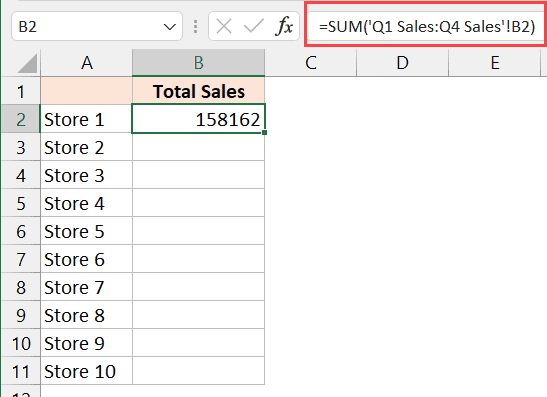How to Sum Totals Across Excel Sheets Easily

Managing data across multiple sheets in Excel can be both a challenge and a necessity, especially when you're dealing with large datasets or complex financial models. Whether you're an accountant finalizing a quarterly report, a project manager tracking multiple project components, or a student aggregating research data, knowing how to sum totals across different sheets efficiently is a vital skill. This comprehensive guide will walk you through various techniques to seamlessly integrate your data, ensuring accuracy and saving you time.
Understanding Excel’s External References

Before diving into methods, let’s clarify what Excel’s external references are. An external reference, also known as a link, allows you to create formulas in one sheet that refer to cells or ranges in another sheet or even in another workbook. This capability is the foundation for summing data across sheets. Here’s how it works:
- Simple external reference: =‘[WorkbookName.xlsx]SheetName’!CellReference
- Formula with external reference: =‘[WorkbookName.xlsx]SheetName’!A1+Sheet2!A1
Method 1: Using the SUM Function with External References

This is one of the simplest and most straightforward methods:
- Select the cell where you want the total to appear.
- Type =SUM( followed by the cell or range you wish to sum from each sheet, separated by commas. For example, if you have a series of sheets named Sheet1, Sheet2, and Sheet3, and you want to sum cell A1 from each:
- Press Enter to get the total.
=SUM(Sheet1!A1, Sheet2!A1, Sheet3!A1)
⚠️ Note: Ensure your sheet names are correctly spelled and the referenced cells exist.
Method 2: Using 3-D References

For summing the same cell or range across multiple sheets that follow a sequential naming pattern:
- Select the cell for your total.
- Enter the formula as =SUM(Sheet1:Sheet3!A1) if you want to sum A1 from Sheet1 through Sheet3.
| Pros | Cons |
|---|---|
| Very quick for large ranges | Sheets must be in sequential order |

Method 3: The Consolidate Tool

The Consolidate feature in Excel allows you to combine data from multiple ranges into one, perfect for summarizing data from various sheets:
- Go to Data > Consolidate.
- Choose Sum from the Function dropdown.
- Select each range from different sheets that you want to consolidate. Use the external reference format to add each range.
- Enable Use labels in if your data has headers.
- Click OK.
✅ Note: Consolidation updates automatically as source data changes.
Method 4: Creating a Summary Sheet

If you’re dealing with a lot of data, a summary sheet can be invaluable:
- Create a new blank sheet for the summary.
- In cell A1 of the summary sheet, enter =Sheet1!A1.
- Copy this formula across the cells or rows in the summary sheet corresponding to where you want the data from each sheet to appear.
- Use SUM across these cells to get your total.
This method is great for when you need not just the sum but also an overview of specific cells or ranges from each sheet.
Considerations for Large Data Sets

When dealing with large data sets or many sheets:
- Performance: Summing across numerous sheets can slow Excel down. Consider using Power Query or Excel’s Power Pivot for better performance.
- Maintainability: Clearly name your sheets, and keep a well-documented structure. Consider naming conventions or using color codes for different data types.
- Backup and Version Control: Always back up your work. Multiple sheets can lead to confusion about which data is current.
To sum up, Excel provides several methods to sum totals across sheets, from straightforward external references to more sophisticated tools like Consolidation and 3-D references. By mastering these techniques, you can streamline your data management process, making it more efficient, accurate, and manageable. Remember to keep your workbook organized and consider using additional features like Power Query for enhanced data manipulation when dealing with larger or more complex datasets.
Can I link cells from different workbooks?

+
Yes, you can create links between different workbooks in Excel using external references. Just ensure that both workbooks are open, or you’ll get an error.
What if my sheets aren’t named sequentially?

+
If your sheets aren’t sequentially named, you can still use external references but you’ll have to list each sheet individually in the SUM function.
How do I update totals when sheets change?

+
Excel will automatically update your totals as long as the formulas reference cells correctly. Use Consolidate or create a summary sheet for dynamic updates.
Can I use functions other than SUM with external references?

+
Absolutely! Functions like AVERAGE, COUNT, MAX, and MIN can also be used across different sheets in a similar manner.
How to handle errors when summing across sheets?

+
Ensure sheets and cells exist. Use IFERROR to handle errors gracefully or check for any changes in sheet names or cell references that might disrupt the links.